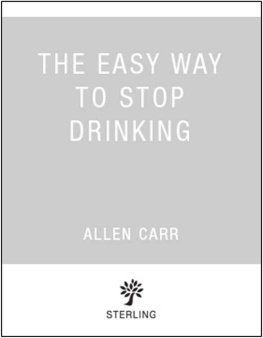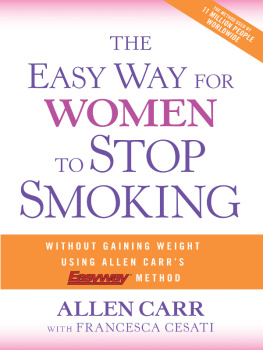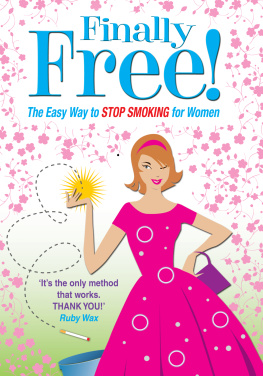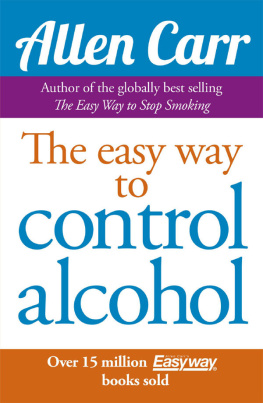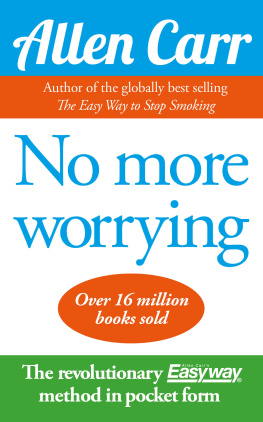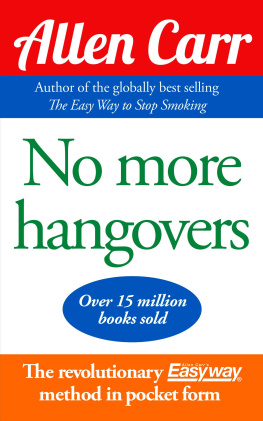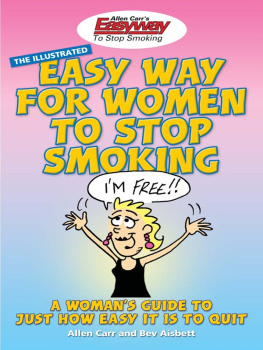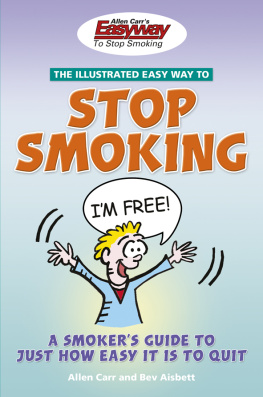To Sam Carroll, our candle in the wind
And to Emma Hudson, not only a fabulous member of our brilliant Easyway therapist team who have saved hundreds of thousands of smokers lives, but also a truly inspirational sage of mindfulness
With editorial contributions from Tim Glynne-Jones
Chapter 5: Unhappiness
IN THIS CHAPTER
A glass half empty Whats getting you down? The box of flies Pouncing and hiding Exercise: the body scan
We carry a lot of illusions around with us assumptions and preconceptions that get fixed in our minds. Sadly, these assumptions and preconceptions have a tendency to be negative.
A glass half empty
Weve talked already about how intelligence is the flaw in the incredible human machine. It makes us susceptible to false information and overrides instinct to leave us vulnerable to harm. Intelligence also sets us apart from other animals in the way we are geared for survival. While animals rely on their senses to trigger the responses of fight or flight, we have the additional capacity to learn from the past and think ahead.
This intellectual capacity has made us very adept at averting danger, building defences, and militating against setbacks. But it has also left us with a tendency to focus on negative thoughts. Research has shown that when our minds are left to wander we actually become less happy.
Our intellectual approach to survival has conditioned our wandering minds to settle on problems rather than pleasures, for the simple reason that problems are more likely to kill us. We also learn faster from negative experiences than from positive ones.
Perhaps youre thinking the message Im trying to put across is that were all doomed to unhappiness because its the only way we survive. Not at all. Im talking about a mental conditioning that evolved in a time when life was considerably more dangerous than it is today, with the constant threat of attack from predators or death by hunger, cold, and natural disasters.
Times have changed but much of the conditioning remains. Scientists call it the negativity bias the tendency to focus on our problems. The problem is that our minds dont just tend to focus on problems, they exaggerate them. We create artificial scenarios in our minds that cause us undue stress.
No doubt youve experienced the fear of lying in bed at night and hearing a floorboard creak. Your mind flies to the thought that theres an intruder in the house. Your heart starts pounding; your ears prick up; you lie dead still listening for confirmation of your impending doom. Despite the fact that very few people ever have an intruder in their house, it is in our nature to leap to the conclusion that every creaking floorboard at night is a threat.
Its a pessimistic approach to life that ensures we suffer regardless of how things turn out.
WHATS GETTING YOU DOWN?
We have much to be happy about these days. We live longer, find food and warmth easily, travel faster and further, and get to see and experience more. And yet all these things bring their own problems, which we tend to focus on: the incapacity of old age, the cost of food and fuel bills, delays on the roads, railways and airports, the fear of missing out on something.
Whatever life offers us, we seem to be able to turn it into a negative. And there are plenty of things in life that seem to present us with constant worries.
Money
Who hasnt ever had money worries? As the saying goes, No matter how much youve got, its never enough. The cost of living and making ends meet is a major worry for people from all walks of life. Even when were able to afford a comfortable lifestyle, we worry whether were living as well as the people next door or whether it will last. The money we earn affects whether we feel valued and how we value ourselves. We worry about making enough money to support our dependents. We even worry about leaving enough money for our loved ones when we die. We worry about having enough money to join in and to be perceived as generous. And if we should ever be fortunate enough to have more money than we need, we worry about sharing it with others.
Work
We commit a sizeable amount of our lives to work and thats a sizeable amount of time spent worrying. Theres the pressure to stay employed, which means dealing with the pressure to perform and meet targets. We worry about earning enough money, getting on with people, building constructive relationships, and climbing the career ladder. We feel the pressure of managing our hours, remembering all our obligations, and being on time. Which brings us on to the next ever-present worry.
Time
Who invented time? Whoever it was, they didnt make quite enough of it, did they? How often do you find yourself wishing you had one more hour in the day or one more day in the week? Like money, no matter how much time we have, its never quite enough. We all possess the same amount of time every day, out of which we need to find some for work, some for home life, some for free time and recreation, some for family and friends. We spend our lives trying to strike a healthy work-life balance, but there never seems to be enough time for everything we want to do.
Relationships
All of the above can have a negative effect on relationships. When youre stressed, it affects your relationships at work, home, and elsewhere. It also affects your relationship with yourself. You know when youre behaving unreasonably, but when youre feeling pressured by money, work, or time, it can be hard to change your behaviour. The way we interact with others and the way we regard ourselves have a major effect on our happiness. The slightest sign of friction can create the belief in your mind that someone dislikes you. When you feel a relationship turning sour, it creates additional stress, causing a downward spiral. This can damage your relationship with yourself just as much as one with someone else.
Health
Medical science has made enormous strides in the last hundred years yet health remains a major source of stress. As laymen, we know a lot more about the threats to our health than our forefathers did, so we have more to worry about. We dont just worry about diseases, we worry about what we eat and drink, how much we weigh, what we look like, how much sleep we get the list is endless. We can literally worry ourselves sick.
Vices
Then there are the things we do that we wish we didnt: addictions, for example, which we believe were reliant on as an escape from stress. The fact that we cant get control of our vices becomes a cause of even more stress, which in turn makes us feel more trapped.
Everything else
Even when were feeling liberated from the common stresses mentioned above, other things can come along and push us back into a negative mindset. Politics, terrorism, a distant war, the weather
THE BOX OF FLIES
There are enough pressures in life to justify the negativity bias. And yet research has shown that, in the first world, positive experiences outnumber negative ones by three to one. If our mood responded directly to the things we experience in life, we should spend three-quarters of our lives feeling happy.
But our minds naturally wander towards negativity and we become caught up in a downward spiral. When we feel low, we are more susceptible to worrying. The more we worry, the lower we feel. The worry itself becomes another source of stress, exacerbating the problem and making it hard to escape the vicious circle.
All the pressures and stresses buzz around your head like flies in a box. Instead of calm and relaxation, you are subjected to the constant noise of thoughts flying around your brain. You typically respond in one of three ways:
Lashing out
Pretending they dont exist
Thinking them through
Imagine swatting out at a swarm of flies buzzing around you in a box. The effect is futile. It only makes you more stressed. Thats what happens when you respond with aggression to the negative thoughts in your head.
Next page


